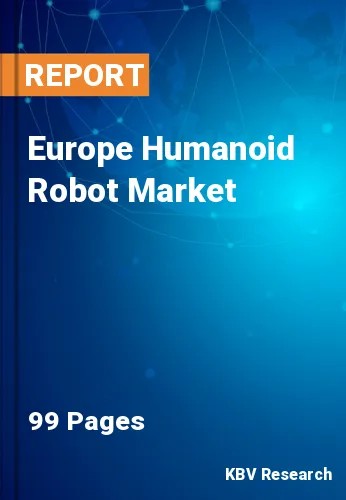The Europe Humanoid Robot Market would witness market growth of 52.5% CAGR during the forecast period (2023-2030).
The demand for robotic aids is increasing, driving the market to grow likewise. The population is aging, which is one of the causes of this. Seniors who need assistance with tasks that are too difficult or dangerous to carry out, including washing large things, can use humanoid robots. Because they are usually elderly and feeble, residents of nursing homes are more prone to accidents and illnesses. As a result, there is now a higher need for humanoid caregiving robots in nursing homes.
As more players enter the robotics ecosystem and concentrate on more advanced robot development, robot manufacturers increasingly rely on Intellectual Property (IP) systems to safeguard their interests. These robots continue to employ both hostile and protective IP techniques. Due to the capital-intensive nature of R&D beforehand commercialization and the requirement for regulatory approval, patent protection can be crucial in this field. It aids companies in gaining an economic advantage over competitors, recovering their investments, and defending inventions that are susceptible to reverse engineering.
The UK government predicted that autonomous technologies like self-driving vehicles and surgical robots would grow into an everyday aspect of routine within twenty years, revolutionizing how people live, work, and travel. With an investment of £34 million in October 2019, the UK government is taking a step closer to creating robots that can support citizens and make caring for others easier. So-called "care robots" could contribute to increasing the assistance that the UK's specialized senior social care industry can offer to those who need it most, with one in seven people in the country anticipated to be over 75 by 2040. The expansion of the regional market is predicted to be supported by all these variables taken together.
The Germany market dominated the Europe Humanoid Robot Market by Country in 2022, and would continue to be a dominant market till 2030; thereby, achieving a market value of $2,470.3 Million by 2030. The UK market is exhibiting a CAGR of 51.2% during (2023 - 2030). Additionally, The France market would showcase a CAGR of 53.6% during (2023 - 2030).
Based on Component, the market is segmented into Hardware and Software. Based on Application, the market is segmented into Personal Assistance & Caregiving, Hospitality, Research & Space Exploration, Education & Entertainment, Search & Rescue and Others. Based on Motion Type, the market is segmented into Wheel drive and Biped. Based on countries, the market is segmented into Germany, UK, France, Russia, Spain, Italy, and Rest of Europe.
Free Valuable Insights: The Worldwide Humanoid Robot Market is Projected to reach USD 39.6 Billion by 2030, at a CAGR of 52.8%
The market research report covers the analysis of key stake holders of the market. Key companies profiled in the report include Hajime Research Institute, Ltd., Hanson Robotics Limited, Honda Motor Co. Ltd., HYULIM Robot Co., Ltd., KAWADA Robotics Corporation (Kawada Technologies Co., Ltd.), PAL ROBOTICS, SoftBank Robotics Group (SoftBank Group Corporation), Toshiba Corporation, Toyota Motor Corporation and Trossen Robotics.
By Component
By Application
By Motion Type
By Country
Our team of dedicated experts can provide you with attractive expansion opportunities for your business.

